Detailed Examination of Statutory Interpretation in Sri Lanka and UK
VerifiedAdded on 2020/06/03
|8
|2070
|35
Report
AI Summary
This report provides a detailed exploration of the interpretation of statutes, a critical process in which courts apply and understand legislation. It begins by outlining the stages of law-making in a legislature, emphasizing the preparation, parliamentary stages, and royal assent. The report then examines the Interpretation Act of 1978 and ordinances in Sri Lanka, highlighting how judges interpret statutes. It discusses the use of Hansard, treaties, and international conventions, along with the interpretation of ordinances in Sri Lanka and the UK's Interpretation Act of 1978. The report further delves into law commission reports, white papers, the history of statutes, established court jurisdiction, and retrospective legislation, providing a comprehensive overview of the principles and methods used in statutory interpretation. The report concludes with a summary of the key concepts, emphasizing the importance of legal interpretation in applying rules and regulations.
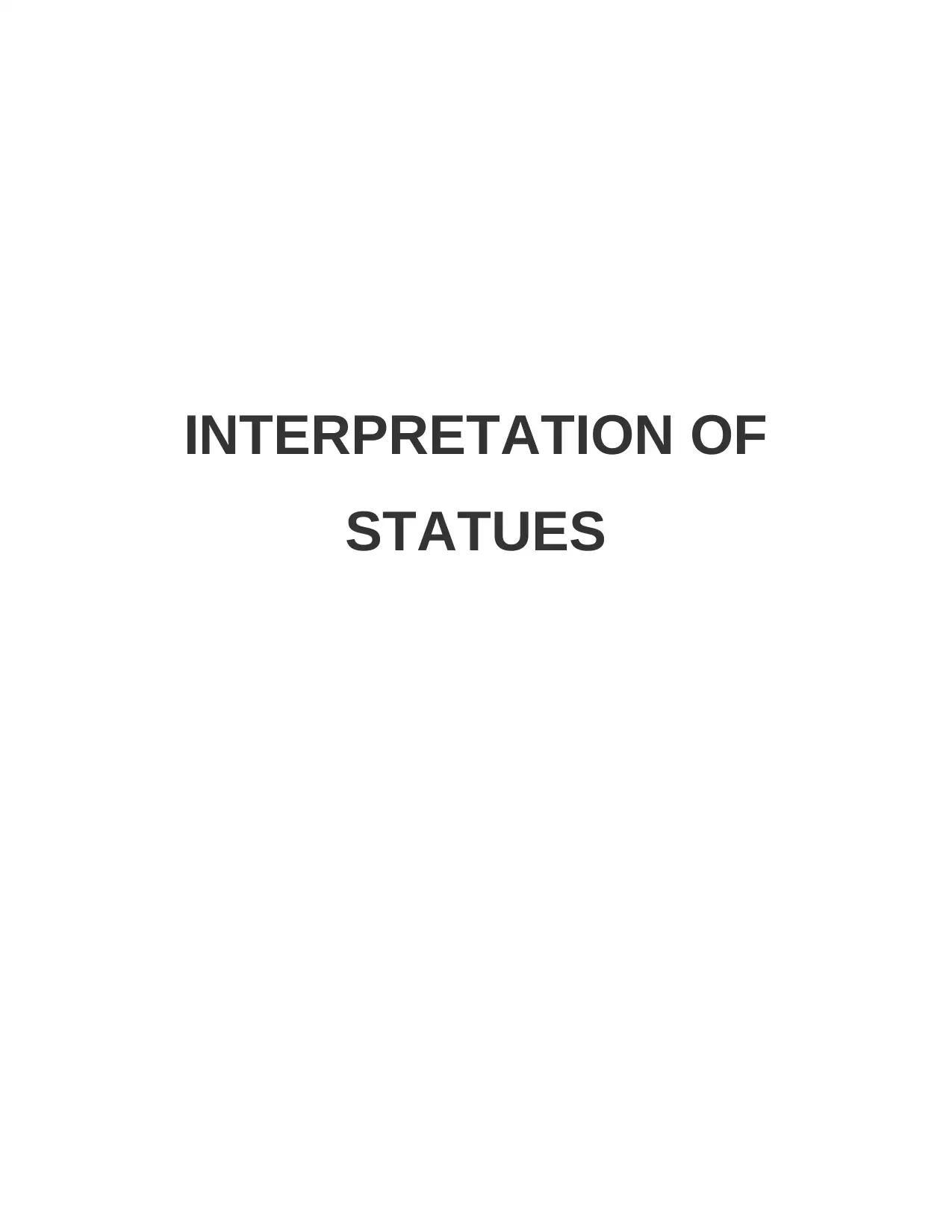
INTERPRETATION OF
STATUES
STATUES
Paraphrase This Document
Need a fresh take? Get an instant paraphrase of this document with our AI Paraphraser
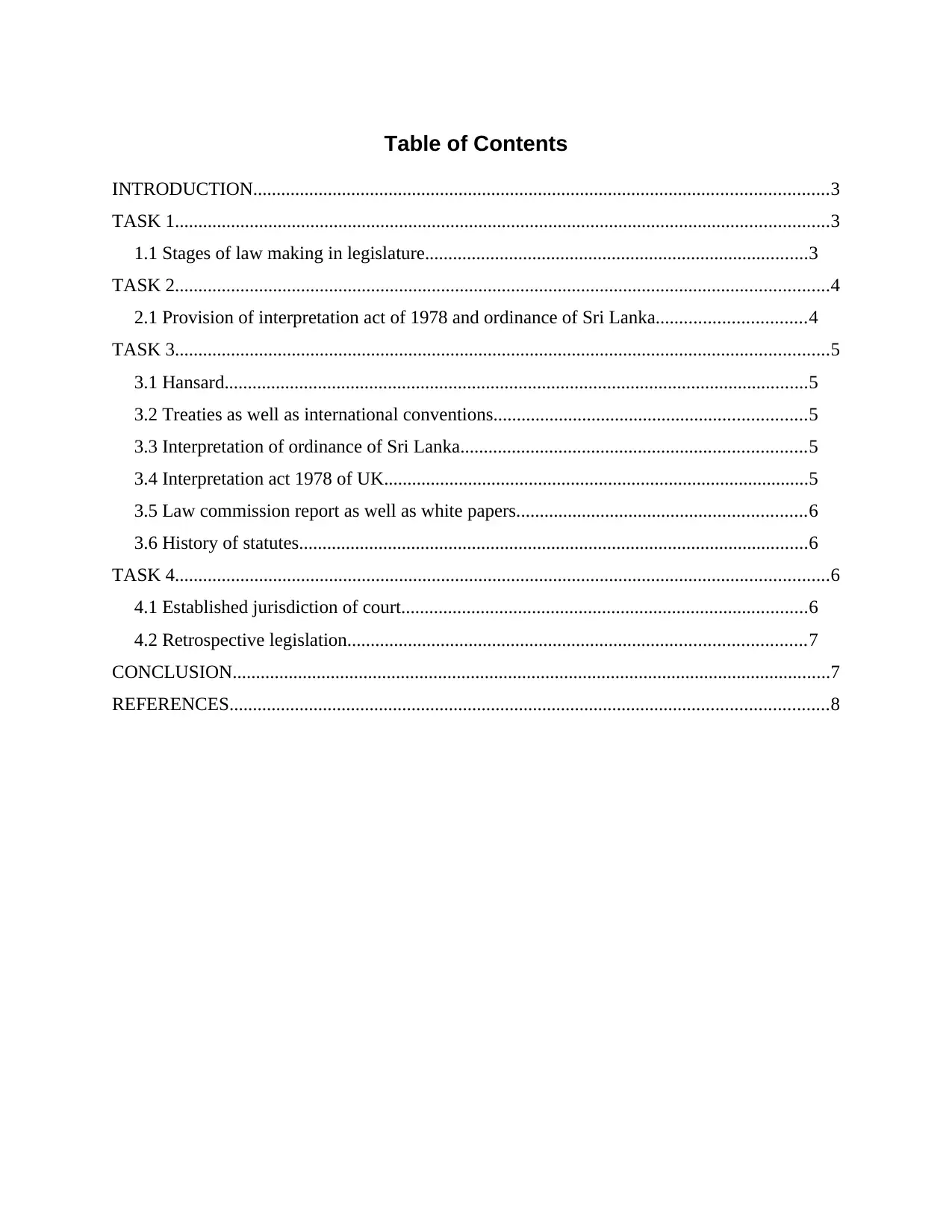
Table of Contents
INTRODUCTION...........................................................................................................................3
TASK 1............................................................................................................................................3
1.1 Stages of law making in legislature..................................................................................3
TASK 2............................................................................................................................................4
2.1 Provision of interpretation act of 1978 and ordinance of Sri Lanka................................4
TASK 3............................................................................................................................................5
3.1 Hansard.............................................................................................................................5
3.2 Treaties as well as international conventions...................................................................5
3.3 Interpretation of ordinance of Sri Lanka..........................................................................5
3.4 Interpretation act 1978 of UK...........................................................................................5
3.5 Law commission report as well as white papers..............................................................6
3.6 History of statutes.............................................................................................................6
TASK 4............................................................................................................................................6
4.1 Established jurisdiction of court.......................................................................................6
4.2 Retrospective legislation..................................................................................................7
CONCLUSION................................................................................................................................7
REFERENCES................................................................................................................................8
INTRODUCTION...........................................................................................................................3
TASK 1............................................................................................................................................3
1.1 Stages of law making in legislature..................................................................................3
TASK 2............................................................................................................................................4
2.1 Provision of interpretation act of 1978 and ordinance of Sri Lanka................................4
TASK 3............................................................................................................................................5
3.1 Hansard.............................................................................................................................5
3.2 Treaties as well as international conventions...................................................................5
3.3 Interpretation of ordinance of Sri Lanka..........................................................................5
3.4 Interpretation act 1978 of UK...........................................................................................5
3.5 Law commission report as well as white papers..............................................................6
3.6 History of statutes.............................................................................................................6
TASK 4............................................................................................................................................6
4.1 Established jurisdiction of court.......................................................................................6
4.2 Retrospective legislation..................................................................................................7
CONCLUSION................................................................................................................................7
REFERENCES................................................................................................................................8
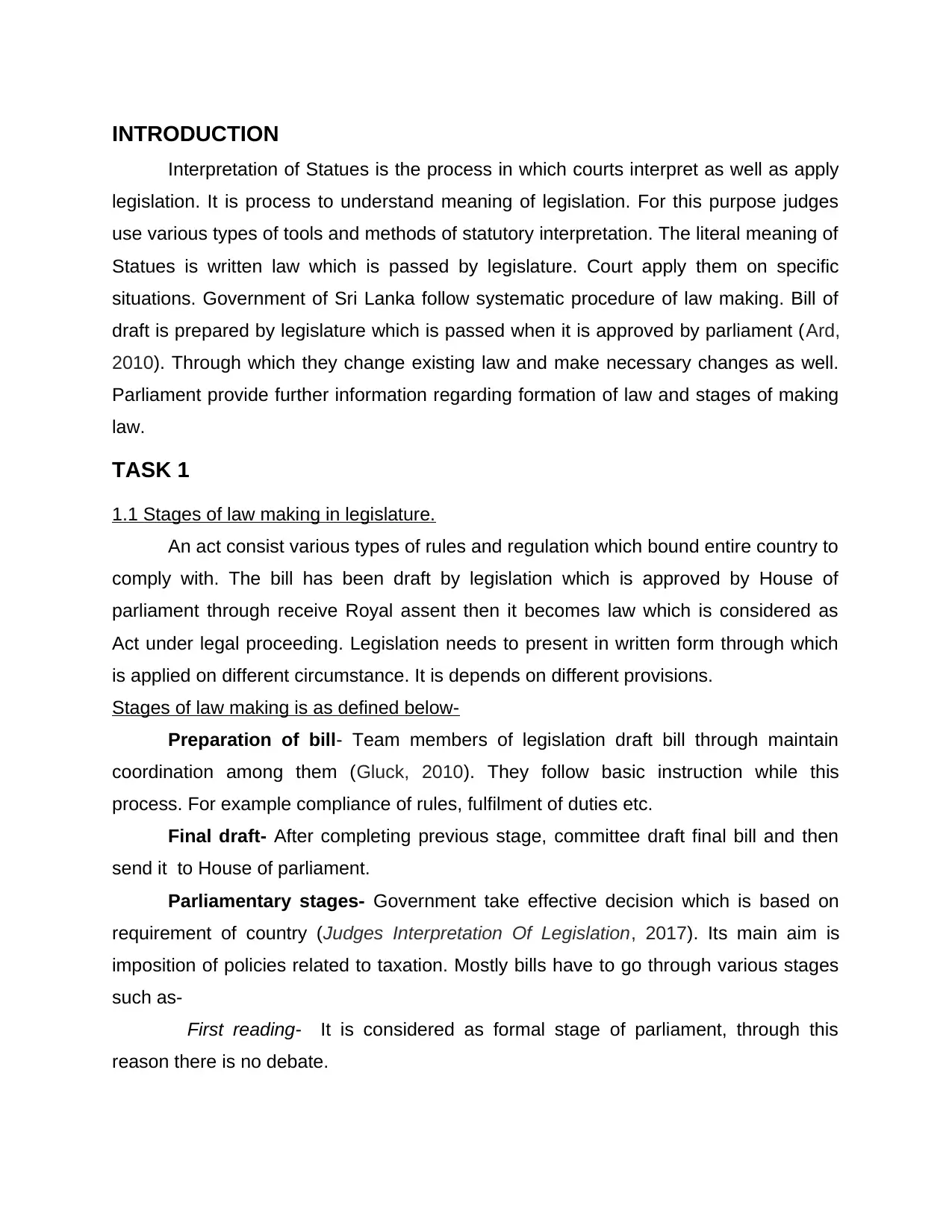
INTRODUCTION
Interpretation of Statues is the process in which courts interpret as well as apply
legislation. It is process to understand meaning of legislation. For this purpose judges
use various types of tools and methods of statutory interpretation. The literal meaning of
Statues is written law which is passed by legislature. Court apply them on specific
situations. Government of Sri Lanka follow systematic procedure of law making. Bill of
draft is prepared by legislature which is passed when it is approved by parliament (Ard,
2010). Through which they change existing law and make necessary changes as well.
Parliament provide further information regarding formation of law and stages of making
law.
TASK 1
1.1 Stages of law making in legislature.
An act consist various types of rules and regulation which bound entire country to
comply with. The bill has been draft by legislation which is approved by House of
parliament through receive Royal assent then it becomes law which is considered as
Act under legal proceeding. Legislation needs to present in written form through which
is applied on different circumstance. It is depends on different provisions.
Stages of law making is as defined below-
Preparation of bill- Team members of legislation draft bill through maintain
coordination among them (Gluck, 2010). They follow basic instruction while this
process. For example compliance of rules, fulfilment of duties etc.
Final draft- After completing previous stage, committee draft final bill and then
send it to House of parliament.
Parliamentary stages- Government take effective decision which is based on
requirement of country (Judges Interpretation Of Legislation, 2017). Its main aim is
imposition of policies related to taxation. Mostly bills have to go through various stages
such as-
First reading- It is considered as formal stage of parliament, through this
reason there is no debate.
Interpretation of Statues is the process in which courts interpret as well as apply
legislation. It is process to understand meaning of legislation. For this purpose judges
use various types of tools and methods of statutory interpretation. The literal meaning of
Statues is written law which is passed by legislature. Court apply them on specific
situations. Government of Sri Lanka follow systematic procedure of law making. Bill of
draft is prepared by legislature which is passed when it is approved by parliament (Ard,
2010). Through which they change existing law and make necessary changes as well.
Parliament provide further information regarding formation of law and stages of making
law.
TASK 1
1.1 Stages of law making in legislature.
An act consist various types of rules and regulation which bound entire country to
comply with. The bill has been draft by legislation which is approved by House of
parliament through receive Royal assent then it becomes law which is considered as
Act under legal proceeding. Legislation needs to present in written form through which
is applied on different circumstance. It is depends on different provisions.
Stages of law making is as defined below-
Preparation of bill- Team members of legislation draft bill through maintain
coordination among them (Gluck, 2010). They follow basic instruction while this
process. For example compliance of rules, fulfilment of duties etc.
Final draft- After completing previous stage, committee draft final bill and then
send it to House of parliament.
Parliamentary stages- Government take effective decision which is based on
requirement of country (Judges Interpretation Of Legislation, 2017). Its main aim is
imposition of policies related to taxation. Mostly bills have to go through various stages
such as-
First reading- It is considered as formal stage of parliament, through this
reason there is no debate.
⊘ This is a preview!⊘
Do you want full access?
Subscribe today to unlock all pages.

Trusted by 1+ million students worldwide
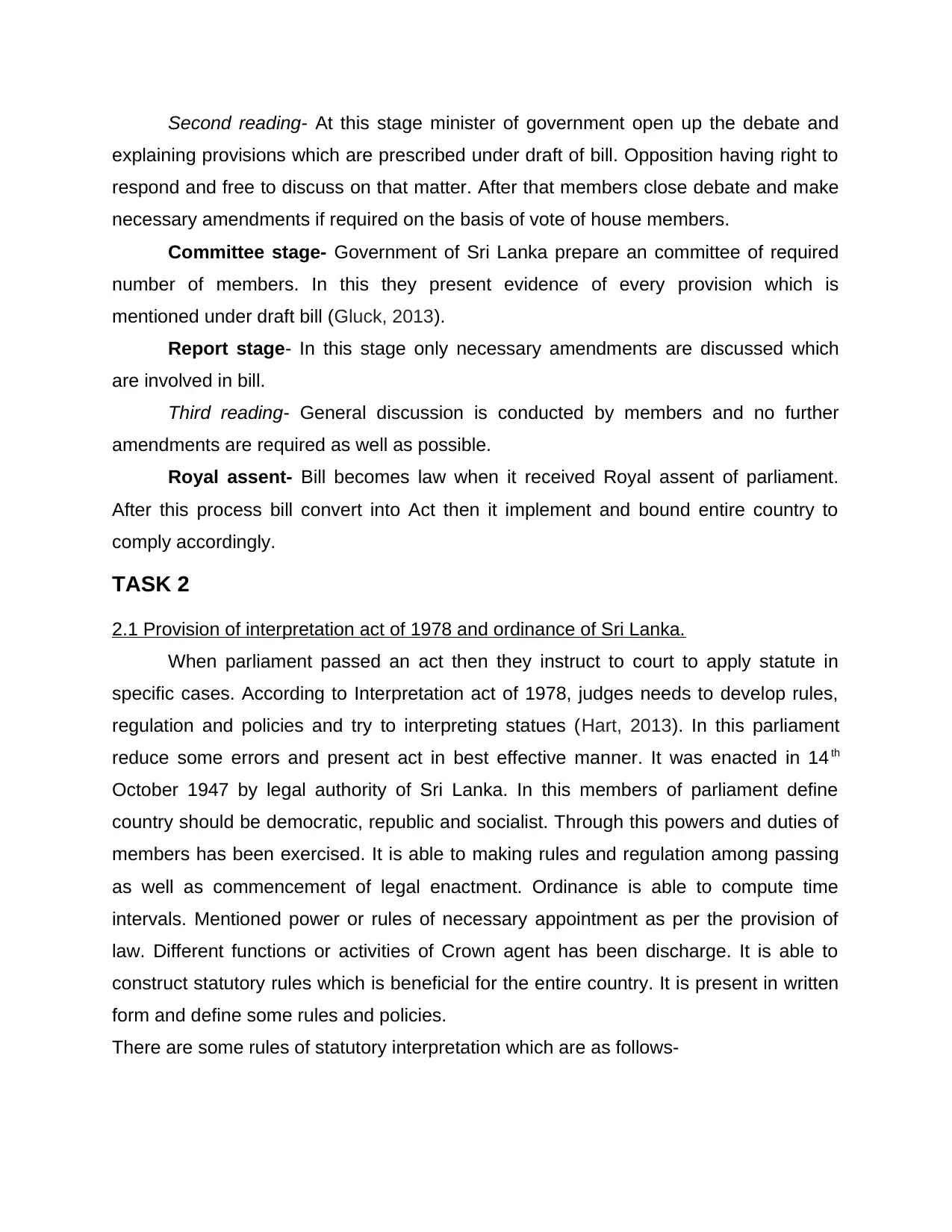
Second reading- At this stage minister of government open up the debate and
explaining provisions which are prescribed under draft of bill. Opposition having right to
respond and free to discuss on that matter. After that members close debate and make
necessary amendments if required on the basis of vote of house members.
Committee stage- Government of Sri Lanka prepare an committee of required
number of members. In this they present evidence of every provision which is
mentioned under draft bill (Gluck, 2013).
Report stage- In this stage only necessary amendments are discussed which
are involved in bill.
Third reading- General discussion is conducted by members and no further
amendments are required as well as possible.
Royal assent- Bill becomes law when it received Royal assent of parliament.
After this process bill convert into Act then it implement and bound entire country to
comply accordingly.
TASK 2
2.1 Provision of interpretation act of 1978 and ordinance of Sri Lanka.
When parliament passed an act then they instruct to court to apply statute in
specific cases. According to Interpretation act of 1978, judges needs to develop rules,
regulation and policies and try to interpreting statues (Hart, 2013). In this parliament
reduce some errors and present act in best effective manner. It was enacted in 14 th
October 1947 by legal authority of Sri Lanka. In this members of parliament define
country should be democratic, republic and socialist. Through this powers and duties of
members has been exercised. It is able to making rules and regulation among passing
as well as commencement of legal enactment. Ordinance is able to compute time
intervals. Mentioned power or rules of necessary appointment as per the provision of
law. Different functions or activities of Crown agent has been discharge. It is able to
construct statutory rules which is beneficial for the entire country. It is present in written
form and define some rules and policies.
There are some rules of statutory interpretation which are as follows-
explaining provisions which are prescribed under draft of bill. Opposition having right to
respond and free to discuss on that matter. After that members close debate and make
necessary amendments if required on the basis of vote of house members.
Committee stage- Government of Sri Lanka prepare an committee of required
number of members. In this they present evidence of every provision which is
mentioned under draft bill (Gluck, 2013).
Report stage- In this stage only necessary amendments are discussed which
are involved in bill.
Third reading- General discussion is conducted by members and no further
amendments are required as well as possible.
Royal assent- Bill becomes law when it received Royal assent of parliament.
After this process bill convert into Act then it implement and bound entire country to
comply accordingly.
TASK 2
2.1 Provision of interpretation act of 1978 and ordinance of Sri Lanka.
When parliament passed an act then they instruct to court to apply statute in
specific cases. According to Interpretation act of 1978, judges needs to develop rules,
regulation and policies and try to interpreting statues (Hart, 2013). In this parliament
reduce some errors and present act in best effective manner. It was enacted in 14 th
October 1947 by legal authority of Sri Lanka. In this members of parliament define
country should be democratic, republic and socialist. Through this powers and duties of
members has been exercised. It is able to making rules and regulation among passing
as well as commencement of legal enactment. Ordinance is able to compute time
intervals. Mentioned power or rules of necessary appointment as per the provision of
law. Different functions or activities of Crown agent has been discharge. It is able to
construct statutory rules which is beneficial for the entire country. It is present in written
form and define some rules and policies.
There are some rules of statutory interpretation which are as follows-
Paraphrase This Document
Need a fresh take? Get an instant paraphrase of this document with our AI Paraphraser
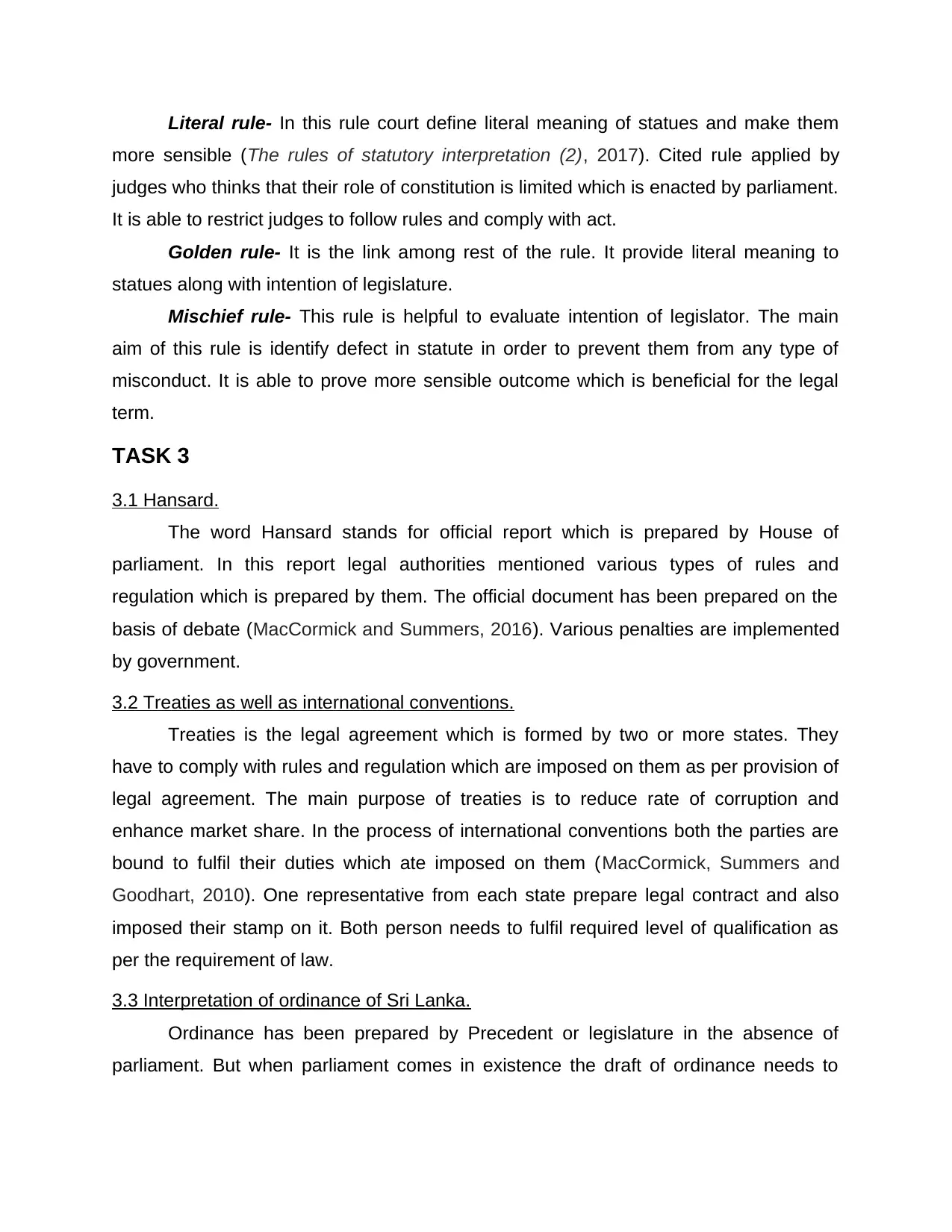
Literal rule- In this rule court define literal meaning of statues and make them
more sensible (The rules of statutory interpretation (2), 2017). Cited rule applied by
judges who thinks that their role of constitution is limited which is enacted by parliament.
It is able to restrict judges to follow rules and comply with act.
Golden rule- It is the link among rest of the rule. It provide literal meaning to
statues along with intention of legislature.
Mischief rule- This rule is helpful to evaluate intention of legislator. The main
aim of this rule is identify defect in statute in order to prevent them from any type of
misconduct. It is able to prove more sensible outcome which is beneficial for the legal
term.
TASK 3
3.1 Hansard.
The word Hansard stands for official report which is prepared by House of
parliament. In this report legal authorities mentioned various types of rules and
regulation which is prepared by them. The official document has been prepared on the
basis of debate (MacCormick and Summers, 2016). Various penalties are implemented
by government.
3.2 Treaties as well as international conventions.
Treaties is the legal agreement which is formed by two or more states. They
have to comply with rules and regulation which are imposed on them as per provision of
legal agreement. The main purpose of treaties is to reduce rate of corruption and
enhance market share. In the process of international conventions both the parties are
bound to fulfil their duties which ate imposed on them (MacCormick, Summers and
Goodhart, 2010). One representative from each state prepare legal contract and also
imposed their stamp on it. Both person needs to fulfil required level of qualification as
per the requirement of law.
3.3 Interpretation of ordinance of Sri Lanka.
Ordinance has been prepared by Precedent or legislature in the absence of
parliament. But when parliament comes in existence the draft of ordinance needs to
more sensible (The rules of statutory interpretation (2), 2017). Cited rule applied by
judges who thinks that their role of constitution is limited which is enacted by parliament.
It is able to restrict judges to follow rules and comply with act.
Golden rule- It is the link among rest of the rule. It provide literal meaning to
statues along with intention of legislature.
Mischief rule- This rule is helpful to evaluate intention of legislator. The main
aim of this rule is identify defect in statute in order to prevent them from any type of
misconduct. It is able to prove more sensible outcome which is beneficial for the legal
term.
TASK 3
3.1 Hansard.
The word Hansard stands for official report which is prepared by House of
parliament. In this report legal authorities mentioned various types of rules and
regulation which is prepared by them. The official document has been prepared on the
basis of debate (MacCormick and Summers, 2016). Various penalties are implemented
by government.
3.2 Treaties as well as international conventions.
Treaties is the legal agreement which is formed by two or more states. They
have to comply with rules and regulation which are imposed on them as per provision of
legal agreement. The main purpose of treaties is to reduce rate of corruption and
enhance market share. In the process of international conventions both the parties are
bound to fulfil their duties which ate imposed on them (MacCormick, Summers and
Goodhart, 2010). One representative from each state prepare legal contract and also
imposed their stamp on it. Both person needs to fulfil required level of qualification as
per the requirement of law.
3.3 Interpretation of ordinance of Sri Lanka.
Ordinance has been prepared by Precedent or legislature in the absence of
parliament. But when parliament comes in existence the draft of ordinance needs to
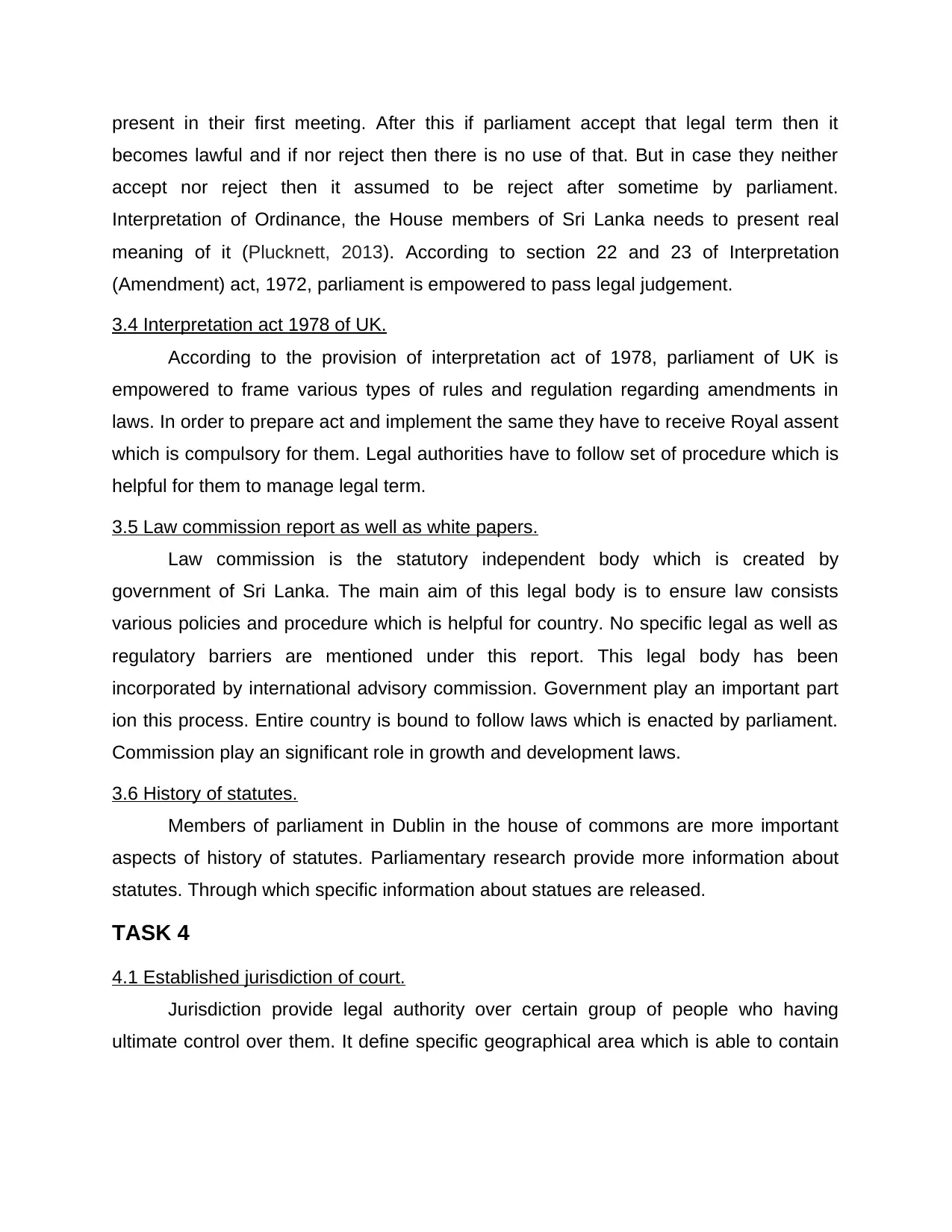
present in their first meeting. After this if parliament accept that legal term then it
becomes lawful and if nor reject then there is no use of that. But in case they neither
accept nor reject then it assumed to be reject after sometime by parliament.
Interpretation of Ordinance, the House members of Sri Lanka needs to present real
meaning of it (Plucknett, 2013). According to section 22 and 23 of Interpretation
(Amendment) act, 1972, parliament is empowered to pass legal judgement.
3.4 Interpretation act 1978 of UK.
According to the provision of interpretation act of 1978, parliament of UK is
empowered to frame various types of rules and regulation regarding amendments in
laws. In order to prepare act and implement the same they have to receive Royal assent
which is compulsory for them. Legal authorities have to follow set of procedure which is
helpful for them to manage legal term.
3.5 Law commission report as well as white papers.
Law commission is the statutory independent body which is created by
government of Sri Lanka. The main aim of this legal body is to ensure law consists
various policies and procedure which is helpful for country. No specific legal as well as
regulatory barriers are mentioned under this report. This legal body has been
incorporated by international advisory commission. Government play an important part
ion this process. Entire country is bound to follow laws which is enacted by parliament.
Commission play an significant role in growth and development laws.
3.6 History of statutes.
Members of parliament in Dublin in the house of commons are more important
aspects of history of statutes. Parliamentary research provide more information about
statutes. Through which specific information about statues are released.
TASK 4
4.1 Established jurisdiction of court.
Jurisdiction provide legal authority over certain group of people who having
ultimate control over them. It define specific geographical area which is able to contain
becomes lawful and if nor reject then there is no use of that. But in case they neither
accept nor reject then it assumed to be reject after sometime by parliament.
Interpretation of Ordinance, the House members of Sri Lanka needs to present real
meaning of it (Plucknett, 2013). According to section 22 and 23 of Interpretation
(Amendment) act, 1972, parliament is empowered to pass legal judgement.
3.4 Interpretation act 1978 of UK.
According to the provision of interpretation act of 1978, parliament of UK is
empowered to frame various types of rules and regulation regarding amendments in
laws. In order to prepare act and implement the same they have to receive Royal assent
which is compulsory for them. Legal authorities have to follow set of procedure which is
helpful for them to manage legal term.
3.5 Law commission report as well as white papers.
Law commission is the statutory independent body which is created by
government of Sri Lanka. The main aim of this legal body is to ensure law consists
various policies and procedure which is helpful for country. No specific legal as well as
regulatory barriers are mentioned under this report. This legal body has been
incorporated by international advisory commission. Government play an important part
ion this process. Entire country is bound to follow laws which is enacted by parliament.
Commission play an significant role in growth and development laws.
3.6 History of statutes.
Members of parliament in Dublin in the house of commons are more important
aspects of history of statutes. Parliamentary research provide more information about
statutes. Through which specific information about statues are released.
TASK 4
4.1 Established jurisdiction of court.
Jurisdiction provide legal authority over certain group of people who having
ultimate control over them. It define specific geographical area which is able to contain
⊘ This is a preview!⊘
Do you want full access?
Subscribe today to unlock all pages.

Trusted by 1+ million students worldwide
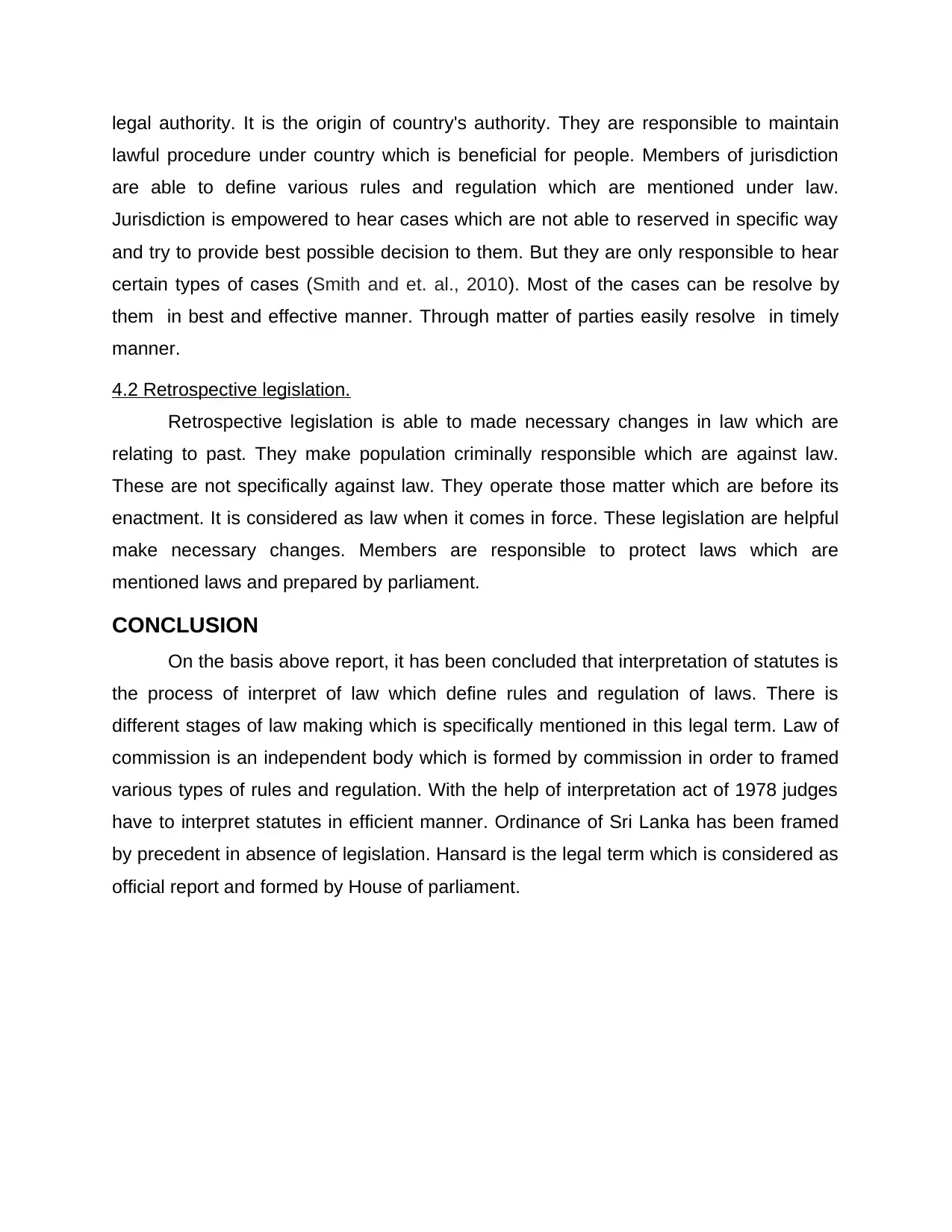
legal authority. It is the origin of country's authority. They are responsible to maintain
lawful procedure under country which is beneficial for people. Members of jurisdiction
are able to define various rules and regulation which are mentioned under law.
Jurisdiction is empowered to hear cases which are not able to reserved in specific way
and try to provide best possible decision to them. But they are only responsible to hear
certain types of cases (Smith and et. al., 2010). Most of the cases can be resolve by
them in best and effective manner. Through matter of parties easily resolve in timely
manner.
4.2 Retrospective legislation.
Retrospective legislation is able to made necessary changes in law which are
relating to past. They make population criminally responsible which are against law.
These are not specifically against law. They operate those matter which are before its
enactment. It is considered as law when it comes in force. These legislation are helpful
make necessary changes. Members are responsible to protect laws which are
mentioned laws and prepared by parliament.
CONCLUSION
On the basis above report, it has been concluded that interpretation of statutes is
the process of interpret of law which define rules and regulation of laws. There is
different stages of law making which is specifically mentioned in this legal term. Law of
commission is an independent body which is formed by commission in order to framed
various types of rules and regulation. With the help of interpretation act of 1978 judges
have to interpret statutes in efficient manner. Ordinance of Sri Lanka has been framed
by precedent in absence of legislation. Hansard is the legal term which is considered as
official report and formed by House of parliament.
lawful procedure under country which is beneficial for people. Members of jurisdiction
are able to define various rules and regulation which are mentioned under law.
Jurisdiction is empowered to hear cases which are not able to reserved in specific way
and try to provide best possible decision to them. But they are only responsible to hear
certain types of cases (Smith and et. al., 2010). Most of the cases can be resolve by
them in best and effective manner. Through matter of parties easily resolve in timely
manner.
4.2 Retrospective legislation.
Retrospective legislation is able to made necessary changes in law which are
relating to past. They make population criminally responsible which are against law.
These are not specifically against law. They operate those matter which are before its
enactment. It is considered as law when it comes in force. These legislation are helpful
make necessary changes. Members are responsible to protect laws which are
mentioned laws and prepared by parliament.
CONCLUSION
On the basis above report, it has been concluded that interpretation of statutes is
the process of interpret of law which define rules and regulation of laws. There is
different stages of law making which is specifically mentioned in this legal term. Law of
commission is an independent body which is formed by commission in order to framed
various types of rules and regulation. With the help of interpretation act of 1978 judges
have to interpret statutes in efficient manner. Ordinance of Sri Lanka has been framed
by precedent in absence of legislation. Hansard is the legal term which is considered as
official report and formed by House of parliament.
Paraphrase This Document
Need a fresh take? Get an instant paraphrase of this document with our AI Paraphraser
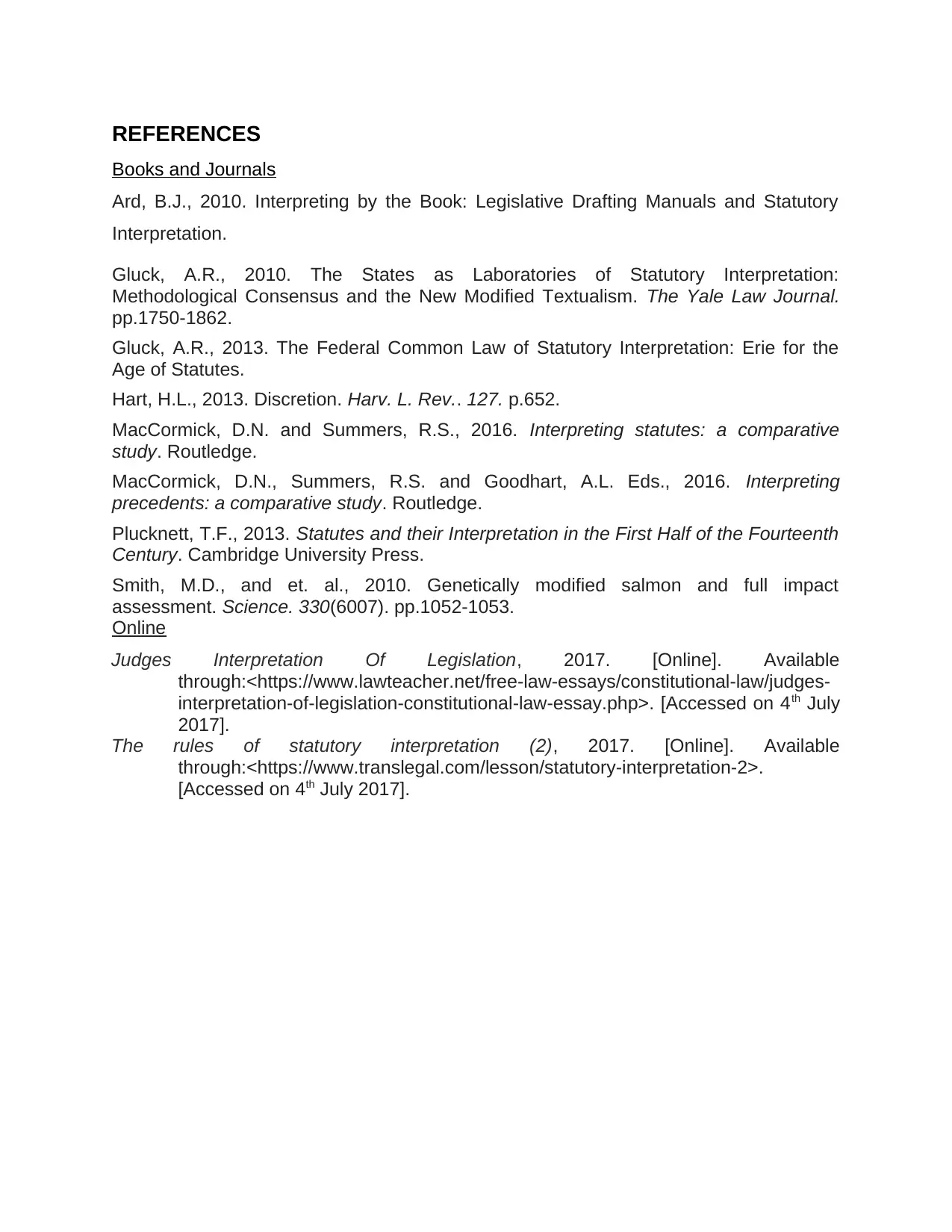
REFERENCES
Books and Journals
Ard, B.J., 2010. Interpreting by the Book: Legislative Drafting Manuals and Statutory
Interpretation.
Gluck, A.R., 2010. The States as Laboratories of Statutory Interpretation:
Methodological Consensus and the New Modified Textualism. The Yale Law Journal.
pp.1750-1862.
Gluck, A.R., 2013. The Federal Common Law of Statutory Interpretation: Erie for the
Age of Statutes.
Hart, H.L., 2013. Discretion. Harv. L. Rev.. 127. p.652.
MacCormick, D.N. and Summers, R.S., 2016. Interpreting statutes: a comparative
study. Routledge.
MacCormick, D.N., Summers, R.S. and Goodhart, A.L. Eds., 2016. Interpreting
precedents: a comparative study. Routledge.
Plucknett, T.F., 2013. Statutes and their Interpretation in the First Half of the Fourteenth
Century. Cambridge University Press.
Smith, M.D., and et. al., 2010. Genetically modified salmon and full impact
assessment. Science. 330(6007). pp.1052-1053.
Online
Judges Interpretation Of Legislation, 2017. [Online]. Available
through:<https://www.lawteacher.net/free-law-essays/constitutional-law/judges-
interpretation-of-legislation-constitutional-law-essay.php>. [Accessed on 4th July
2017].
The rules of statutory interpretation (2), 2017. [Online]. Available
through:<https://www.translegal.com/lesson/statutory-interpretation-2>.
[Accessed on 4th July 2017].
Books and Journals
Ard, B.J., 2010. Interpreting by the Book: Legislative Drafting Manuals and Statutory
Interpretation.
Gluck, A.R., 2010. The States as Laboratories of Statutory Interpretation:
Methodological Consensus and the New Modified Textualism. The Yale Law Journal.
pp.1750-1862.
Gluck, A.R., 2013. The Federal Common Law of Statutory Interpretation: Erie for the
Age of Statutes.
Hart, H.L., 2013. Discretion. Harv. L. Rev.. 127. p.652.
MacCormick, D.N. and Summers, R.S., 2016. Interpreting statutes: a comparative
study. Routledge.
MacCormick, D.N., Summers, R.S. and Goodhart, A.L. Eds., 2016. Interpreting
precedents: a comparative study. Routledge.
Plucknett, T.F., 2013. Statutes and their Interpretation in the First Half of the Fourteenth
Century. Cambridge University Press.
Smith, M.D., and et. al., 2010. Genetically modified salmon and full impact
assessment. Science. 330(6007). pp.1052-1053.
Online
Judges Interpretation Of Legislation, 2017. [Online]. Available
through:<https://www.lawteacher.net/free-law-essays/constitutional-law/judges-
interpretation-of-legislation-constitutional-law-essay.php>. [Accessed on 4th July
2017].
The rules of statutory interpretation (2), 2017. [Online]. Available
through:<https://www.translegal.com/lesson/statutory-interpretation-2>.
[Accessed on 4th July 2017].
1 out of 8
Related Documents
Your All-in-One AI-Powered Toolkit for Academic Success.
+13062052269
info@desklib.com
Available 24*7 on WhatsApp / Email
![[object Object]](/_next/static/media/star-bottom.7253800d.svg)
Unlock your academic potential
Copyright © 2020–2026 A2Z Services. All Rights Reserved. Developed and managed by ZUCOL.




